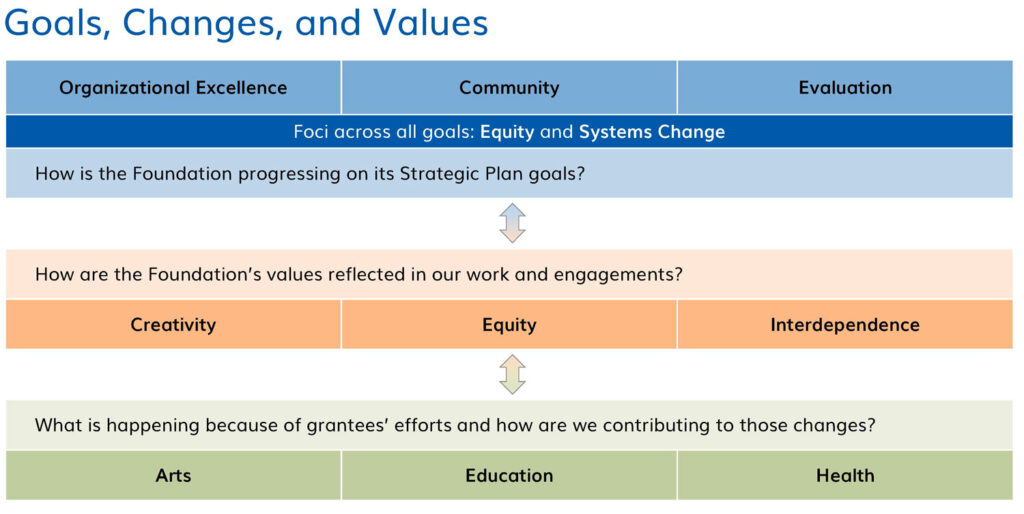How do funders know they are contributing to the change and progress they want to see in the world? This question has flummoxed even the most sophisticated philanthropic and government institutions. The truth is it’s difficult to know with certainty or attribute change to any one individual, entity, initiative or movement. But that hasn’t stopped a multibillion-dollar evaluation industry from developing or impeded the Kenneth Rainin Foundation’s desire to answer this question.
The Rainin Foundation has always been a learning organization and after 13 years of listening, experimenting and iterating, we began a process last fall to develop our first learning and evaluation framework. To help advance this work, we engaged Informing Change, a strategic consulting firm dedicated to increasing the effectiveness and impact of people who are working to build a better world. In this blog, I’ll walk you through our approach and process and share details of our new framework.
Understanding The Roots Of Evaluation
The Equitable Evaluation Initiative served as an essential resource providing insights into the history of evaluation in philanthropy. Many of the widely adopted beliefs, practices and approaches in philanthropic evaluation have their roots in accountability for government and research institutions. Early evaluation practices evolved to protect foundations and have resulted in standardized methods and limiting assumptions that rarely consider cultural context or structural inequities. Under this evaluation mindset, foundations and their external evaluators have held all the power, determining both the markers of success and how to distribute resources. Foundations have defunded entire sectors, such as the arts, that have deep intrinsic value to humans and society, based on these orthodoxies.
“Fresh thinking and an understanding of systemic inequities are informing new and adapted learning and evaluation practices.”
Thankfully, the meaning and purpose of evaluation has been challenged in recent years. Fresh thinking and an understanding of systemic inequities are informing new and adapted learning and evaluation practices. The Equitable Evaluation Initiative helped us understand how to embed equity in our practices and framework as we charted our path with Informing Change.
Our Approach To Meaningful And Equitable Evaluation
Evaluation is a systematic process that examines how, to what extent and for whom outcomes or goals are achieved. The Foundation uses evaluation and learning to generate information and insights that help us test our assumptions and improve our work. So how can we make evaluation equitable and meaningful to us, to our grantees and partners, and to the field at large?

Several criteria guide our decisions about what to evaluate.
- Is it cost-effective?
- Will this data inform course corrections or future funding decisions or the opportunity for learning?
- Will it benefit grantees and partners? Or will it place undue burdens on them?
Designing a framework for use across the Rainin Foundation is not a one size fits all endeavor, it must be adapted to specific needs. Strategic learning questions differ from department to department and program to program. Some learning and evaluation will be for internal purposes, some external.
It’s important to acknowledge the accountability ceiling, or the line that separates the actions and outcomes the Foundation can reasonably impact and influence from those outcomes that are beyond our power to achieve alone. We know that there are external forces at play, additional funders in the spaces we work and that we are several steps removed from the work on the ground. Understanding these factors will keep us honest about our impact and help us better understand what outcomes to monitor.
Learning In Service Of Our Mission And Values
To begin building a new framework, we explored the Foundation’s learning and evaluation goals and prior approaches. Engaging the entire Foundation in this effort was important because every staff member contributes to our mission and vision and has essential insights to offer. The Foundation’s 11 teams and our Board of Directors provided input. Once a first draft of our framework was complete, we asked for feedback from a cohort of strategic partners, advisors and grantees. Their insights helped us refine the framework.
“Evaluation is about curiosity, inquiry, listening and learning in service of innovations that enable the Foundation and our grantees to reach their goals.”
Several common themes emerged throughout our process. Evaluation at the Rainin Foundation is about curiosity, inquiry, listening and learning in service of innovations that enable the Foundation and our grantees to reach their goals. This understanding focused the primary purpose of the evaluation framework on learning in service of our mission and values rather than on accountability goals.
Our Learning And Evaluation Framework

Our Learning and Evaluation Framework has three primary areas of inquiry—goals, changes and values—and helps us answer three questions:
- How is the Foundation progressing on its strategic plan goals focused on equity and systems change?
- How are the Foundation’s values—equity, interdependence and creativity—reflected in our work and engagements?
- What is happening because of grantees’ efforts in the Arts, Education and Health and how is the Foundation contributing to those changes?
The Foundation’s values offer the richest opportunity for cross-strategy, cross-team reflection and learning.
- Exploring equity helps us look at who receives Foundation resources (e.g., grants, investments or vendor contracts) in terms of race, gender and other markers of identity, and the ways in which grant outcomes may or may not advance equity.
- Assessing interdependence provides the opportunity to explore support for collaboration—whether internally between teams or the extent to which grants have enabled collaboration between different nonprofits, artists or researchers.
- Reflecting on creativity helps us understand if we and our grantees have the resources needed to explore new perspectives, test new ideas and gain new insights.
This new framework builds on the evaluation work that our Arts, Education and Health teams are already doing by spotlighting key indicators that are important to understanding change in each program area. While any given metric tells only one piece of a large, complex story, we hope to learn more about our contributions to those changes and how we can continuously improve on the delivery of our mission and vision and help grantees reach their goals.
Looking Ahead
We are grateful to our staff, Board, grantees, strategic partners and advisors for their input and participation in our learning and evaluation journey. We understand that meaningful change can only happen if we are in close partnership with people living and working in the fields and communities we support. As we learn through our evaluation work, we will continue to engage our colleagues and partners to better understand their needs and approaches. We know we don’t have all the answers, which allows us to be open to new and creative solutions to difficult problems. It is a privilege to be able to do the work we do and be in community with passionate creatives, researchers, educators and activists.
Stay tuned as we implement our new framework this fall. We look forward to gleaning new insights and sharing results of what we are learning with the field in 2023. We will continue to adapt the framework based on what we learn and with input from our staff, Board, advisor, grantees and partners.

